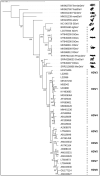HDV-Like Viruses
- PMID: 34201626
- PMCID: PMC8310214
- DOI: 10.3390/v13071207
HDV-Like Viruses
Abstract
Hepatitis delta virus (HDV) is a defective human virus that lacks the ability to produce its own envelope proteins and is thus dependent on the presence of a helper virus, which provides its surface proteins to produce infectious particles. Hepatitis B virus (HBV) was so far thought to be the only helper virus described to be associated with HDV. However, recent studies showed that divergent HDV-like viruses could be detected in fishes, birds, amphibians, and invertebrates, without evidence of any HBV-like agent supporting infection. Another recent study demonstrated that HDV can be transmitted and propagated in experimental infections ex vivo and in vivo by different enveloped viruses unrelated to HBV, including hepatitis C virus (HCV) and flaviviruses such as Dengue and West Nile virus. All this new evidence, in addition to the identification of novel virus species within a large range of hosts in absence of HBV, suggests that deltaviruses may take advantage of a large spectrum of helper viruses and raises questions about HDV origins and evolution.
Keywords: HDV-like viruses; evolution; helper virus; origin.
Conflict of interest statement
The authors declare no conflict of interest.
Figures


References
-
- Rizzetto M., Canese M.G., Arico S., Crivelli O., Trepo C., Bonino F., Verme G. Immunofluorescence Detection of New Antigen-Antibody System (Delta/Anti-Delta) Associated to Hepatitis-B Virus in Liver and in Serum of Hbsag Carriers. Gut. 1977;18:997–1003. doi: 10.1136/gut.18.12.997. - DOI - PMC - PubMed
Publication types
MeSH terms
Substances
LinkOut - more resources
Full Text Sources

